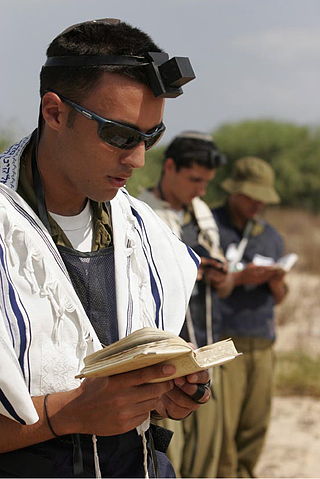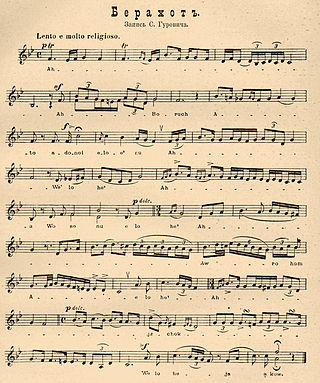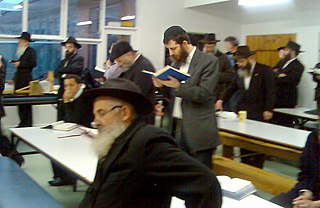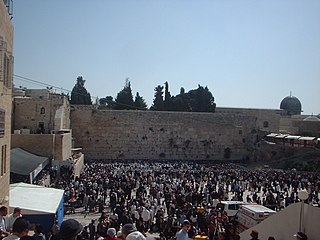Related Research Articles

Jewish prayer is the prayer recitation that forms part of the observance of Rabbinic Judaism. These prayers, often with instructions and commentary, are found in the Siddur, the traditional Jewish prayer book.

Yom Kippur is the holiest day of the year in Judaism. It occurs annually on the 10th of Tishrei, corresponding to a date in late September or early October.

The Amidah, also called the Shemoneh Esreh, is the central prayer of the Jewish liturgy. Observant Jews recite the Amidah at each of three daily prayer services in a typical weekday: morning (Shacharit), afternoon (Mincha), and evening (Ma'ariv). On Shabbat, Rosh Chodesh, and Jewish festivals, a fourth Amidah (Mussaf) is recited after the morning Torah reading, and once per year, a fifth Amidah (Ne'ilah) is recited, around sunset, on Yom Kippur. Due to the importance of the Amidah, in rabbinic literature, it is simply called "hatefila". According to legend, the prayer was composed by the rabbis of the Anshei Knesset HaGedolah. Accordingly, in Judaism, to recite the Amidah is a mitzvah de-rabbanan, i. e., a commandment of rabbinic origin.
The Fast of Gedalia (; צוֹם גְּדַלְיָה Tzom Gedalya), also transliterated from the Hebrew language as Gedaliah or Gedalya(h), is a minor Jewish fast day from dawn until dusk to lament the assassination of Gedaliah, the governor of what was the Kingdom of Judah. His death ended Jewish autonomy following the destruction of the First Temple and the fall of King Zedekiah.

Selichot are Jewish penitential poems and prayers, especially those said in the period leading up to the High Holidays, and on fast days. The Thirteen Attributes of Mercy are a central theme throughout these prayers.

Shacharit, or Shacharis in Ashkenazi Hebrew, is the morning tefillah (prayer) of Judaism, one of the three daily prayers.

Mincha is the afternoon prayer service in Judaism.

In Judaism, the Ten Days of Repentance are the first ten days of the Hebrew month of Tishrei, beginning with the Jewish New Year Rosh Hashanah and ending with the conclusion of Yom Kippur. These days usually fall in September and/or early October.
Mussaf is an additional service that is recited on Shabbat, Yom Tov, Chol Hamoed, and Rosh Chodesh. The service, which is traditionally combined with the Shacharit in synagogues, is considered to be additional to the regular services of Shacharit, Mincha, and Maariv. In contemporary Hebrew, the word may also signify a newspaper supplement.

The Priestly Blessing or priestly benediction, also known in rabbinic literature as raising of the hands, rising to the platform, dukhenen, or duchening, is a Hebrew prayer recited by Kohanim. The text of the blessing is found in Numbers 6:23–27. It is also known as the Aaronic blessing.
Kedushah is the name of several prayers recited during Jewish prayer. They have in common the recitation of two Biblical verses, Isaiah 6:3 and Ezekiel 3:12. These verses come from prophetic visions in which angels sing praises to God.
Ashrei is a prayer that is recited at least three times daily in Jewish prayers, twice during Shacharit and once during Mincha. The prayer is composed primarily of Psalm 145 in its entirety, with Psalms 84:5 and Psalms 144:15 added to the beginning, and Psalms 115:18 added to the end. The first two verses that are added both start with the Hebrew word ashrei, hence the prayer's name.
Avinu Malkeinu is a Jewish prayer recited during Jewish services during the Ten Days of Repentance, from Rosh Hashanah through Yom Kippur inclusive. Since the 17th century, most Eastern Ashkenazic communities recite it also on all fast days; in the Sephardic and Western Ashkenazic tradition it is recited only during the Ten Days of Repentance.
Pesukei dezimra, or zemirot as they are called in the Spanish and Portuguese tradition, are a group of prayers that may be recited during Shacharit. They consist of various blessings, psalms, and sequences of other Biblical verses. Historically, reciting pesukei dezimra in morning prayer was a practice of only the especially pious. Over the course of Jewish history, their recitation has become widespread custom among all of the various rites of Jewish prayer.
Uva letzion are the first Hebrew words, and colloquially the name, of one of the closing prayers of the morning service. The recitation of this prayer is postponed to Mincha on Shabbat and major Jewish holidays, and in Ashkenazic communities to Ne'ila on Yom Kippur.
Nusach Ashkenaz is a style of Jewish liturgy conducted by Ashkenazi Jews. It is primarily a way to order and include prayers, and differs from Nusach Sefard and Baladi-rite prayer, and still more from the Sephardic rite proper, in the placement and presence of certain prayers.

Maariv or Maʿariv, also known as Arvit, or Arbit, is a Jewish prayer service held in the evening or night. It consists primarily of the evening Shema and Amidah.
The Seven-Faceted Blessing is a blessing recited in the Jewish liturgy of Friday evenings. It is similar to the out-loud repetition of the Amidah, which is recited in each daytime prayer. On typical evenings, the Amidah is recited only silently, with no out-loud repetition, but on Friday nights, in honor of the Sabbath, the Seven-Faceted Blessing is recited as an abbreviated repetition.

The Italian Nusach is the ancient prayer rite (nusach) of the long-standing Italian Jewish (Italkim) community on the Italian Peninsula, used by Jews who are not of Ashkenazi or Sephardic origin.
Ani hu ha-sho'el is a Selicha piyyut for Yom Kippur; in most rites, but not all, it is recited in the Musaf service. It is composed by Rabbi Baruch ben Samuel of Mainz. As is common in Selichot for Musaf, the Selicha describes the Yom Kippur service in the Temple and the loss since the destruction of the Temple. In many communities, it is recited aloud by the Hazzan with a moving melody. Usually, even in communities where it is customary to recite the Selichot on a multi-year cycle and to choose only some of the Selichot each year, this Selicha is recited each year.
References
- ↑ According to Talmudic law, Ne'ilah is recited on all public fast days, see Taanit 26a. Nevertheless, the universal practice since the times of the Geonim has been to recite it only on Yom Kippur.
- ↑ "Neilah Judaism". Britannica.com.